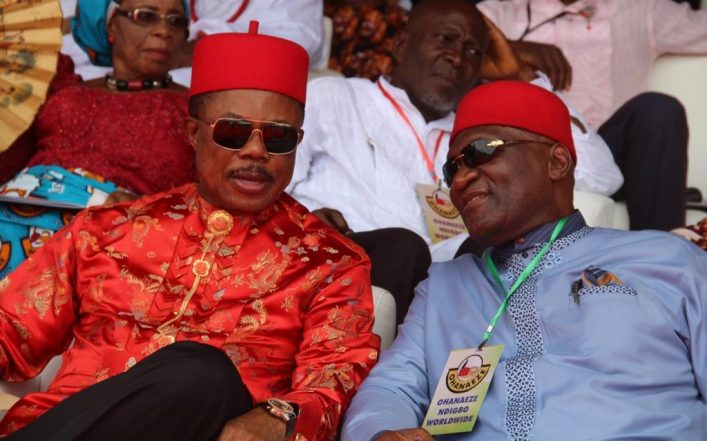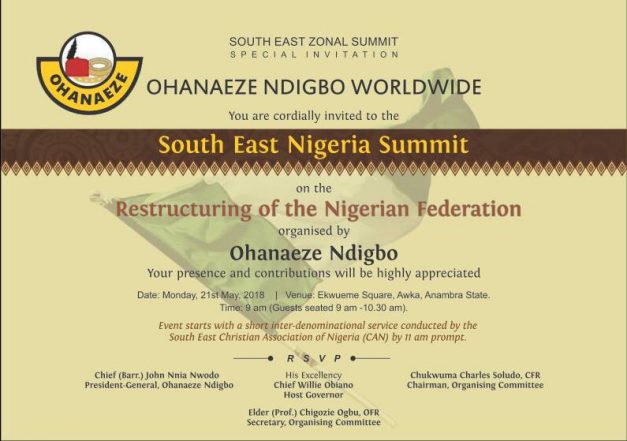
Ndigbo Ask For Better Nigeria With Ekwueme Square Declaration
By James Eze (eziokwubundu@gmail.com)
The Igbo ethnic nationality of Nigeria rose from their Summit on the Restructuring of Nigeria in Awka the capital of Anambra State on Monday with a Ten-point wish list seeking for a balanced federation that would meet their needs and the needs of other ethnic groups in Nigeria.
The Igbo position on restructuring which has been re-christened as ‘The Ekwueme Square Declaration;’ is a tightly knitted ten-point demand for a better Nigeria which opens with a demand for a Constitutional Conference backed by a law from the National Assembly that would provide a unanimously accepted platform where the diverse people of Nigeria would hammer out a new constitution that would be known as “The People’s Constitution.”
Delivering the Declaration at the hugely successful ceremony, the former governor of the Central Bank of Nigeria, Prof Chukwuma Soludo who is the Chairman of the Organizing Committee stated that the second item on the Igbo demand seeks a slight amendment to the current system of government as it recommends the retention of the presidential system only at the federal level, leaving the regions or states to choose the type of government that is best for them. But perhaps the most audacious demand under this point is that the tenure of the office of the President should be a single term of six years with five Vice-Presidents representing each of the geopolitical zones except the zone that produced the President. The demand prescribes the same tenure for Governors and Deputy Governors which would be rotated among the senatorial districts.
The third demand asks for six geopolitical zones forming the federating units or six regions of the country. There will therefore be six regional governments, each comprising the current states within each zone and any other state that may be created within the zone from time to time. Each Region will have its own Constitution, for the good governance, peace and development of the region. Such Regional Constitutions have to clearly delineate levels of authority between the regional government and the component states (that is, defining powers that are exclusive to the Region and powers that are residual to the states). The Regional Constitutions will not be inconsistent with the Constitution of the federation, and will be invalidated to the extent of its inconsistency with the federal constitution. It seeks a review of the current revenue sharing formula based on local governments to a new structure based on regions. Consequent upon this, the Ekwueme Declaration therefore demands for an additional state for the South East Zone in line with the 2014 National Conference which states that in the spirit of reconciliation, equity, fair play and justice, a new state should be created in the South East.
The forth demand is for equality of all the regions or states that become the federating units while the fifth insists on the scrapping of the concept of State of Origin from the constitution to be replaced by the State of Residence. Expounding this concept The Ekwueme Square Declaration recommends that ‘any child born of Nigerian parents anywhere in Nigeria should acquire the indigeneship (residency) rights of the area at birth. It also recommended that any Nigerian citizen who has resided in any part of Nigeria and paid taxes there for a period of ten years can acquire the indigeneship (residency) rights of the area, except the right to their traditional stool.
The sixth demand makes a solid case for a two or three-tier police structure with defined responsibilities that would be controlled by the federal and state or regional governments respectively while the seventh seeks the abrogation of section 162 of the 1999 Constitution which vests control of resources in the federal government. It recommends a truly federal system that gives control of resources to the federal units, vesting ownership rights, control and exploitation of resources in the states. It also argues that the federating units should keep 50% of rents, royalties and profit taxes on minerals from their lands while paying 20% to the regional government and 30% to the federal government.
Demand number eight makes a strong case for the replacement of the Federal Character Commission with Merit and Equal Opportunities Commission to ensure that merit is entrenched in the conduct of national and regional affairs, prescribing that 60% should be reserved for merit and 40% for affirmative action.
The ninth item demands that elections into the office of the President and federal legislature should be conducted by the electoral body of the Federal Government while elections into regional/state offices should be conducted by electoral bodies set up by the regional/state Constitutions or laws.
And finally, the tenth declaration seeks the latitude for federating units to have their own judicial systems with courts of first instance, appellate courts and Supreme courts to adjudicate on matters that are in the concurrent and residual lists as well as matters exclusively preserved for the federating units.
Earlier in his welcome address, the Governor of Anambra State, Chief Willie Obiano had recounted that for 58 years, Ndigbo had worked tirelessly with other Nigerians to lay a foundation for a better federation and a more perfect union.
“We have made the most sacrifices and more often than not, we have also paid the supreme price for the unity of this country. But we have made these sacrifices in the belief that in the contemporary history of mankind, the road to nationhood is often paved with the blood of patriots. Indeed, Ndigbo have paid the price for Nigeria’s greatness. We paid in blood. We paid in FULL!” he declared.
Then, rallying Ndigbo to rise to the occasion, Governor Obiano observed that “the future summons us to a brighter dawn! And we must walk in the shadows of our fathers. Yes, our fathers played a major role in Nigeria’s long road to independence. And today, we have gathered to dream a balanced federation into existence for Nigeria and Nigerians.”
Noting that every nation on earth is work in progress, Governor Obiano observed that “citizens of both advanced and developing countries continue to ask their countries hard questions that will lead them to a better federation, a better nation and a better society. And Nigeria cannot be an exception to this rule. So, we must ask Nigeria hard questions too!”
Governor Obiano further observed that following in the footsteps of their forebears who invested their youthful hopes and intellectual power in Nigeria, the younger generation of Ndigbo have ‘invested our wealth, our enterprise and our emotion in remaking Nigeria. Indeed, no other ethnic group has as much emotional investment in the Nigerian project as Ndigbo. And now, we have been called upon to re-imagine Nigeria. We welcome this challenge with both hands.”
Articulating the wishes and aspirations of Ndigbo, Obiano declared that “as governor of Anambra State, I was born and raised in Nigeria and I have lived in Nigeria for the better part of my life. I have lived the Nigerian Dream and experienced the horrors of Nigeria’s many Heartbreaks. I know what my people want from Nigeria and the question we must ask of Nigeria. We must ask what every forward looking people want from any socio-political arrangement… life, liberty and a chance to raise happy families. We must ask for a just, fair and equitable federation where every citizen is guaranteed the freedom to be the best they can be and to aspire to the highest position in the land regardless of their tribe, culture or religion. And this is what Nigeria in its present structure, has not given to us!”
Also speaking, the 91-year old leader of the Ijaw ethnic nationality, Chief Edwin Clark observed that Ndigbo had been treated very unkindly by the federal government and wondered why Igbo youths who bore no arms and hurt nobody had to be branded as terrorists.
Chief Clark also blamed the federal government for not giving Ndigbo an additional state as recommended in the 2014 Constitutional Conference and insisted that such denials and deprivations were behind the spate of separatist agitations from the region.
The event also featured moving speeches from the leader of Afenifere, Chief Ayo Adebanjo, leader of the Middle Belt, Dan Sulaiman, Chairman of the occasion Chief Emmanuel Iwuanyanwu and former Nigerian Ambassador to Spain, Ambassador Bianca Ojukwu among many others.







